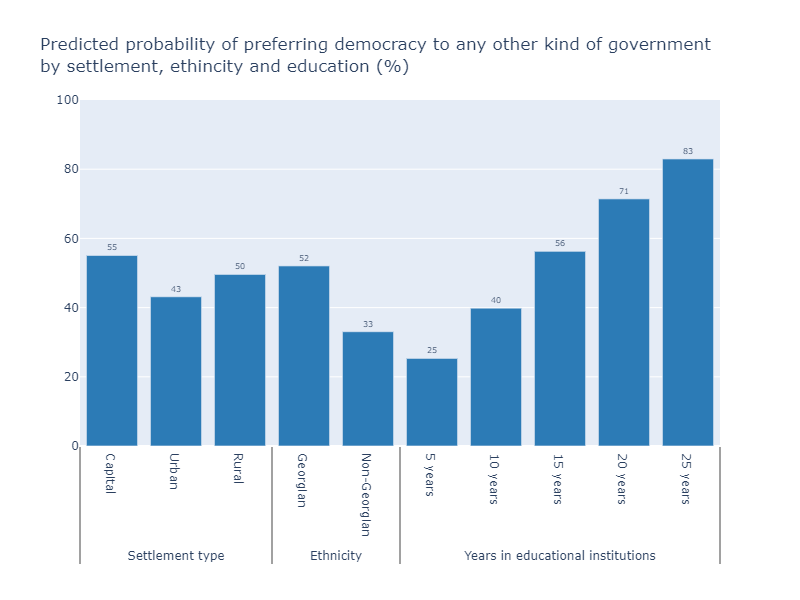
Public opinion polls suggest support for democracy is on the decline in Georgia, but does support for democracy correlate to support for liberal values?
An increasing number of Georgians view their country as ‘a democracy with major problems’, with CRRC’s Caucasus Barometer survey showing the share of people reporting this belief to have increased from 27% in 2011 to 48% in 2019.
In parallel to this growing scepticism towards the country’s democratic situation, surveys show a decline in the proportion of the population believing that democracy is preferable to any other kind of government, falling from 65% in 2011 to 49% in 2019.
Using data from CRRC’s Caucasus Barometer 2019, it’s possible to look at who is more or less likely to prefer democracy and whether support for democracy is linked with support for gender equality and tolerance towards minorities, factors many regard as core values of a liberal democracy
A regression model comparing respondents who think democracy is preferable to any other kind of government (49%) to those that think either that a non-democratic government can be preferable (20%) or that it does not matter to them (14%) suggests that people living in the capital, ethnic Georgians, and those who spent more years in education are more likely to report support for democracy.

No other demographic factors were found to be associated with support for democracy. Aside from demographics, the study tested whether a number of proxies of liberal values were associated with democratic attitudes. These included:
- An index of tolerance towards ethnic minorities, constructed from questions about whether or not a respondent would approve of someone of their ethnicity marrying a person of another ethnic or religious group.
- An index of attitudes towards women’s freedom of action, including whether or not people thought it was acceptable at any age for women to drink strong alcohol, smoke tobacco, live separately from their parents before marriage, have sexual relations before marriage, or cohabit with a man without marriage.
- Attitudes towards gender equality in terms of breadwinning and whether men and women should get the inheritance.
- A variable proxying homophobia, based on whether or not the respondent would least like to have a homosexual as a neighbour.
Regression analysis demonstrates that none of these proxies for liberal values within the models have a significant association with support for democracy.
Support for democracy in Georgia does not appear to be related to tolerance towards ethnic or sexual minorities. Nor is it associated with supporting women’s rights or gender equality. The only significant predictors of support for democracy as the ideal form of government tested were years of education and ethnic minority status.
This could suggest that people simply claim to be supporters of democracy without really knowing or being ready to accept the values that it has to offer. In turn, this would suggest that people are just going along with the idea of democracy without agreeing to its moral standards. However, these ideas remain unconfirmed to a certain extent.
Given the patterns described above, there is a clear need for further in-depth investigation into the determinants of support for democracy.
This article is based on an article published in Caucasus Analytical Digest. The views presented in the article represent the views of the authors’ alone, and do not represent the views of CRRC Georgia or any related entity.








